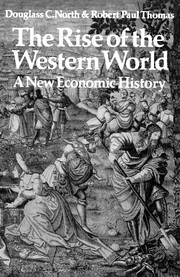Book contents
- Frontmatter
- Contents
- Preface
- PART ONE THEORY AND OVERVIEW
- PART TWO 900–1500
- 3 Property Rights in Land and Man
- 4 Economic Conditions at the End of the Early Middle Ages
- 5 The High Middle Ages: A Frontier Movement
- 6 Thirteenth-Century Europe
- 7 The Fourteenth and Fifteenth Centuries
- PART THREE 1500–1700
- Epilogue
- Bibliography
- Index
6 - Thirteenth-Century Europe
Published online by Cambridge University Press: 05 March 2012
- Frontmatter
- Contents
- Preface
- PART ONE THEORY AND OVERVIEW
- PART TWO 900–1500
- 3 Property Rights in Land and Man
- 4 Economic Conditions at the End of the Early Middle Ages
- 5 The High Middle Ages: A Frontier Movement
- 6 Thirteenth-Century Europe
- 7 The Fourteenth and Fifteenth Centuries
- PART THREE 1500–1700
- Epilogue
- Bibliography
- Index
Summary
The thirteenth century was not like other centuries. First of all, it was not of a hundred years' duration. We do not know when it began nor for certain when it ended, so we cannot know how long it was. The reason for this innocence lies in the fact that for economic historians the thirteenth century refers to the temporal duration of a unique set of forces and is much more easily described than dated.
The thirteenth century brought the end of the frontier movement in Western Europe, but it did not bring the end of population growth, which continued at an impressive rate. Urban places expanded. Trade and commerce flourished locally, regionally and internationally. In short, this was a dynamic era; the culmination of an expansion that had begun in the tenth century. During its indeterminant span of years this era links the growth of a frontier society, where everyone seems to have gained with the horrors of the ‘hateful’ fourteenth century where everyone lost. This bridge between two such diverse periods of medieval history was opulent, filled with contrasts, paradoxes and interesting historical questions. The thirteenth century represents the autumn of the Middle Ages. The paramount questions: Why did the extensive and intensive growth apparent in previous centuries not continue? Why could the economies of Western Europe not escape at this time the Malthusian specter that had previously haunted mankind? These are the important questions and we shall attempt to answer them in this chapter.
- Type
- Chapter
- Information
- The Rise of the Western WorldA New Economic History, pp. 46 - 70Publisher: Cambridge University PressPrint publication year: 1973



